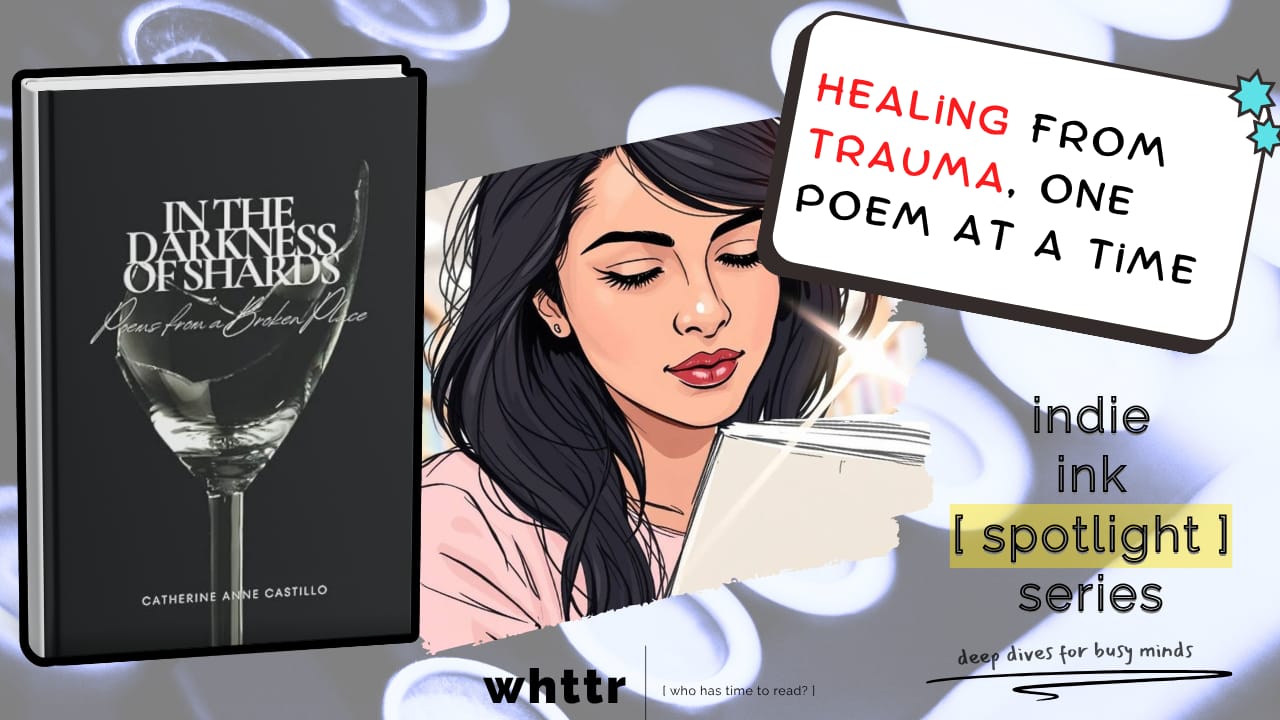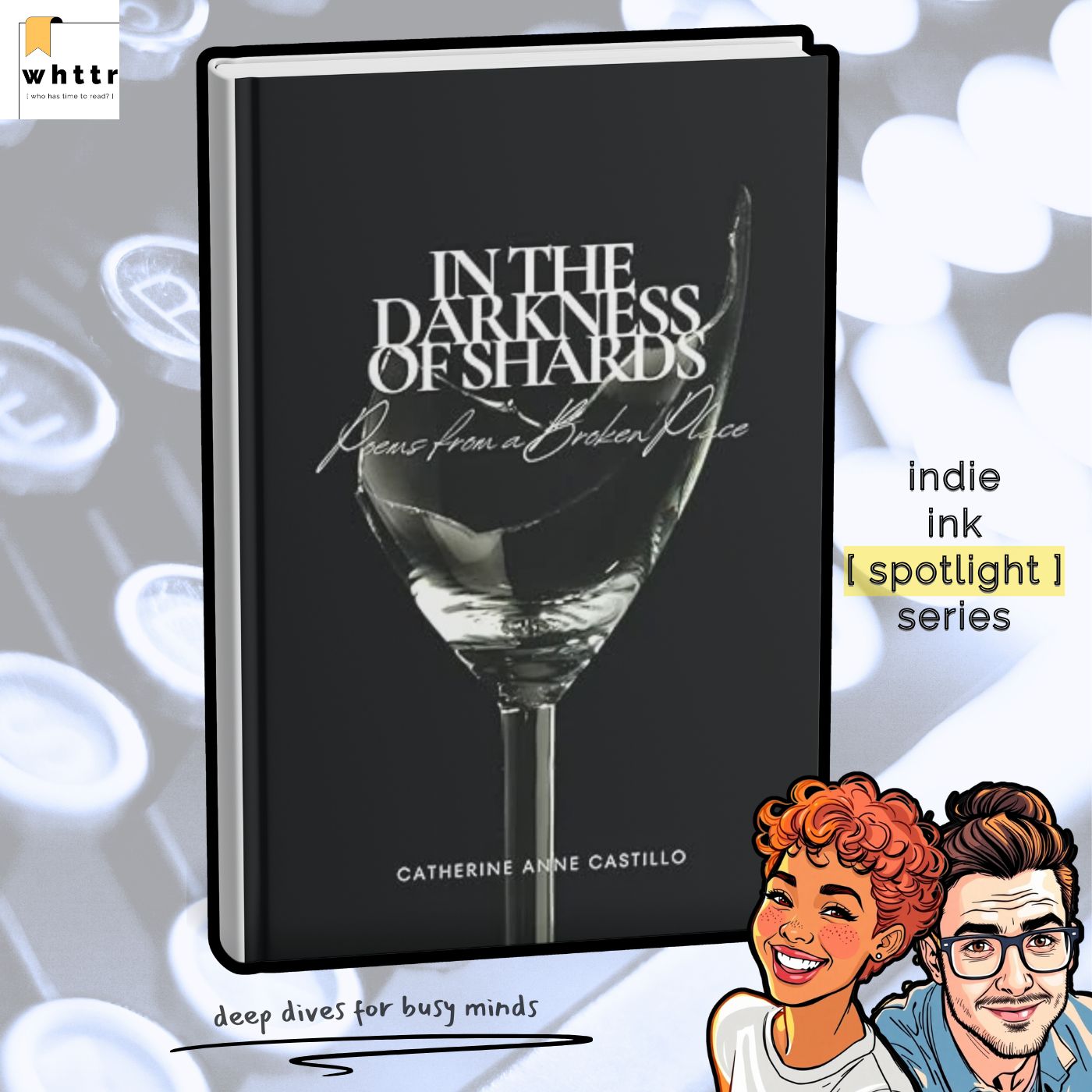- whttr
- Posts
- When Love Hurts Like Poetry - Indie Ink Spotlight
When Love Hurts Like Poetry - Indie Ink Spotlight
Ink That Refuses to Fade: In the Darkness of Shards by Catherine Anne Castillo
A haunting poetic memoir that pulses with urgency, independence, and the quiet rebellion of a writer who wrote it anyway.
💔 Some Poems Don’t Heal—They Bleed
Some books whisper. Others scream in silence. In the Darkness of Shards does both—and then asks you if you still believe in love after losing yourself inside it.
This week on Indie Ink Spotlight, we’re entering the haunted, honey-lit heart of In the Darkness of Shards: Poems from a Broken Place by Catherine Anne Castillo—a poetry collection forged from the rubble of a trauma bond. It’s as tender as it is devastating, and as honest as anything you’ll read this year.
This isn’t just a book—it’s a reckoning. A reclamation. A mirror for anyone who’s loved the wrong person and called it fate.
First Lines
Poetry was their beginning. It was also her way out.
From the first verse, In the Darkness of Shards feels like a breath held too long. Castillo doesn’t dress the pain up. She lets it ache. In “We Were the Spark,” we witness the illusion of a cinematic love—the kind that makes promises wrapped in stardust and Fibonacci rings—only to watch it shatter into emotional gaslighting, self-erasure, and silence.
It’s not trauma porn. It’s not a diary in disguise. It’s something braver.
“It’s a raw, intimate glimpse into the emotional terrain of being inside a trauma bond—before I even had the words for it,” Castillo writes. “The collection traces the slow unraveling from within, capturing what it felt like to love, question, break, and eventually see clearly.” And she does see clearly. So clearly that it hurts. A standout line arrives in a quiet promise to herself: “To guard the edges of my heart, to refuse the role of casualty in someone else’s war.” It’s not just a vow. It’s a boundary. A blueprint for healing. Castillo’s work isn’t interested in poetic cleverness. It’s interested in truth. And sometimes truth arrives raw, dripping, and still shaking. |
Between the Lines
Writing a book from inside a healing wound is a radical act. Catherine Anne Castillo didn’t wait until she was “past” the pain—she wrote from within it, shaping her verses into survival maps for anyone walking a similar path.
What inspired this book—and why now? “This book was born out of the ache of untangling from a trauma bonded relationship with someone who emotionally abused me. Writing became a way to reclaim my voice and make sense of the silence and confusion I carried for too long.” | What’s a scene that holds deep meaning—and why? “One passage that stays with me is: ‘This is my promise: to heal, to learn, to guard the edges of my heart, to refuse the role of casualty in someone else’s war.’” “It reminds me that you can’t be loved by someone who hasn’t learned to love themselves. People become walking projections, and their pain and hate spills onto you. He discarded me, but it was never really about me—and healing meant finally seeing that clearly.” | What’s something readers won’t find in your author bio? “I’ve always loved writing—letters to people I cared about, scribbles in notebooks, even the way I took notes in class. There’s something grounding about putting thoughts onto paper, turning feelings into something I can see or shape.” |
Margins & Meanings
“Being an indie author means I get to tell the truth—unfiltered, unpolished, and fully mine.” |  |
What does it mean to be indie when your story has been silenced before? For Catherine Anne Castillo, it means writing without waiting for permission.
Truth is the currency here. And for a book about emotional abandonment and self-betrayal, the freedom to speak without softening the edges is everything.
Traditional publishing often shies away from books like this—too raw, too female, too “unmarketable.” But indie authors like Castillo prove that vulnerability isn’t a flaw in the story. It is the story. And when the language is this sharp and this clear, it doesn’t need a filter.
“I hope [readers] walk away feeling seen, especially if they’re still untangling from something that hurt. That they realize the confusion, the longing, the pain—it all makes sense in a trauma bond. And that healing isn’t linear, but it is always possible.”
This book doesn’t pretend to tie things up with a bow. It offers instead a flicker of recognition—a gentle nod that says, “You’re not the only one who felt that.”
Castillo’s gift is that she never demands your pity. She offers you your power.
Shelf Life
The Last Page
Some books are survival. Some are testimony.
In the Darkness of Shards is both.
It doesn’t flinch. It doesn’t sugarcoat. It doesn’t pretend that pain makes you poetic. It shows what it means to live through love that hurts—and to write anyway.
We’re honored to spotlight Catherine Anne Castillo this week. Her voice is raw, careful, and luminously unafraid. If you’ve ever stayed too long, said too little, or looked in the mirror and wondered where you went—this one’s for you.
Every Saturday, WHTTR’s Indie Ink Spotlight brings you one truth, one story, and one voice that refuses to vanish.
Because who has time to read?
We do. Together.
The WHTTR Team
✉ Share Your Story Next
Got a voice that’s been overlooked?
Indie Ink Spotlight is a space for authors who write with heat, clarity, and the kind of courage that lingers.
To be considered for a future feature,
📬 email us at [email protected]
with the subject line: Community Exchange
Let’s tell the stories that need to be told.
Published by ONE Media
Disclaimer: Some links contain affiliate links, meaning WHTTR will earn a small commission when you purchase through our link at no additional cost to you. As an Amazon Associate, we earn from qualifying purchases.


Reply